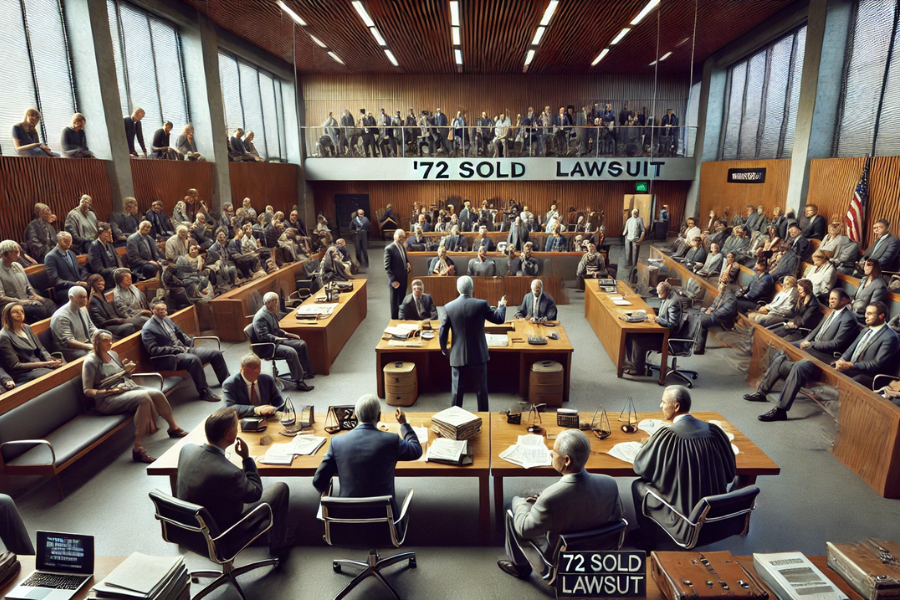Breaking Down Accusations in the Real Estate Sector: The 72 Sold Lawsuit
The realm of real estate acquisition and sale has significantly increased in popularity. Disputes around honesty in advertising, holding businesses responsible, and the proper way for real estate brokers to conduct business have been ignited by the 72 Sold litigation. This lawsuit is making all parties concerned reevaluate how we strike a balance between expediting the sale of homes and maintaining the integrity of the entire system.
The 72 Sold Controversy: Unraveling the Real Estate Disruption

The real estate industry is no stranger to innovation, with new companies and models continually emerging to challenge traditional methods of buying and selling properties. Among these disruptors, 72 Sold stands out for its bold promise: the sale of homes in as little as eight days. This proposition has captured the attention of homeowners and investors alike, offering a seemingly magical solution to one of the most stressful and time-consuming processes in real estate. However, beneath the surface of this promise lies a controversy that has sparked a significant legal battle, bringing into question the ethics, transparency, and business practices of 72 Sold.
Founded in 2018 by Greg Hague, a seasoned real estate professional with deep roots in the Arizona market, 72 Sold quickly expanded its footprint across the United States. The company operates in 38 markets nationwide, bolstered by a strategic partnership with Keller Williams, one of the largest and most respected real estate brokerages in the country. 72 Sold’s unique approach is akin to an auction model, designed to generate excitement and urgency among buyers, thus driving up offers and facilitating a swift sale. This method has been particularly appealing to homeowners eager to avoid the prolonged uncertainty often associated with traditional real estate transactions.
Yet, despite its rapid growth and the initial enthusiasm it generated, 72 Sold now finds itself embroiled in a legal dispute that threatens to undermine its credibility and disrupt its operations. The lawsuit against 72 Sold raises serious questions about the company’s advertising practices, fee structures, and overall transparency. As the case unfolds, it has the potential to not only reshape the future of 72 Sold but also to influence broader industry standards and regulations.
The Genesis of 72 Sold: A Bold Promise in Real Estate
To fully understand the controversy surrounding 72 Sold, it is essential to first explore the origins of the company and the innovative concept it brought to the real estate market. Greg Hague, the founder of 72 Sold, is a well-known figure in Arizona’s real estate community, with decades of experience under his belt. His vision for 72 Sold was born out of a desire to address the common frustrations that homeowners face when selling their properties: long waiting periods, uncertain outcomes, and the complexities of the traditional sales process.
Hague’s solution was to streamline the sales process, offering homeowners a fast and efficient alternative. The core of 72 Sold’s business model is a pre-marketing campaign designed to create high demand for a property before it officially hits the market. This approach involves a combination of targeted advertising, strategic pricing, and limited availability, all intended to generate a sense of urgency among potential buyers. The goal is to attract multiple offers within a short period, thereby driving up the final sale price and reducing the time the property spends on the market.
From the outset, 72 Sold positioned itself as a game-changer in the real estate industry, promising homeowners a hassle-free experience with results that traditional methods could not match. The company’s marketing emphasized speed, convenience, and certainty, appealing to sellers who were looking for a quick turnaround without the usual stress and uncertainty. For many, the idea of selling a home in just eight days was too good to pass up, leading to a surge in demand for 72 Sold’s services.
The Allegations: A Closer Look at the 72 Sold Lawsuit
However, as 72 Sold gained popularity, concerns began to surface about the company’s practices and whether it could consistently deliver on its promises. These concerns culminated in a lawsuit that has cast a shadow over the company’s operations and raised serious questions about its business model.
The lawsuit against 72 Sold is based on a series of allegations that strike at the heart of the company’s marketing and operational practices. The most significant of these allegations is that 72 Sold engaged in misleading advertising, making claims about its ability to sell homes within eight days that were not always achievable. Critics argue that the company’s marketing materials created unrealistic expectations among homeowners, leading them to believe that a quick sale was guaranteed when, in reality, this was not always the case.
In addition to concerns about advertising, the lawsuit also addresses issues related to 72 Sold’s commission structure and fees. According to the plaintiffs, 72 Sold may have engaged in deceptive practices regarding its fees, failing to fully disclose the costs associated with its services upfront. This lack of transparency has allegedly resulted in financial harm to both buyers and sellers, who were unaware of the true cost of using 72 Sold’s services until it was too late.
Another critical aspect of the lawsuit involves the disclosure of essential information to homeowners. The plaintiffs claim that 72 Sold withheld important details about the selling process, including hidden fees and charges that were not communicated clearly from the outset. This lack of transparency has led to dissatisfaction among clients, many of whom felt blindsided by unexpected costs and complications during the sales process.
The Impact of the Lawsuit on Homeowners and the Real Estate Industry
The lawsuit against 72 Sold has significant implications not only for the company but also for the homeowners who have used its services and the broader real estate industry. For the homeowners involved in the lawsuit, the stakes are high. Many of these individuals entrusted 72 Sold with the sale of their most valuable asset—their home—based on the company’s promise of a quick and easy transaction. If the allegations against 72 Sold are proven true, these homeowners could face financial losses and a loss of trust in the real estate process.
For the real estate industry as a whole, the 72 Sold lawsuit serves as a critical moment of reflection. The case raises important questions about the ethics and transparency of real estate transactions, particularly in an era where innovative business models are challenging traditional practices. As the lawsuit progresses, it has the potential to prompt changes in industry standards and regulations, particularly in areas related to advertising, fee disclosure, and consumer protection.
One of the key issues highlighted by the lawsuit is the need for greater transparency in real estate transactions. Homeowners need to be fully informed about the costs and risks associated with selling their property, and companies like 72 Sold must ensure that their marketing and operational practices are clear and honest. The lawsuit also underscores the importance of consumer protection in the real estate industry, particularly as new and unconventional business models emerge.
The Response from 72 Sold: Defending the Business Model
In response to the lawsuit, 72 Sold and its founder Greg Hague have vigorously defended the company’s business model and practices. Hague has maintained that 72 Sold’s approach is fundamentally sound and that the company has consistently delivered positive results for its clients. According to Hague, the lawsuit is based on misunderstandings and isolated incidents that do not reflect the overall success and effectiveness of the 72 Sold program.
Hague and 72 Sold have also emphasized the satisfaction of many of their clients, pointing to numerous testimonials and success stories from homeowners who successfully sold their properties through the program. These clients, Hague argues, represent the true value of 72 Sold’s approach, which he believes offers a viable and innovative alternative to traditional real estate transactions.
In addition to defending the company’s business practices, 72 Sold has also taken steps to address some of the concerns raised by the lawsuit. This includes efforts to improve transparency in their marketing materials and to provide clearer information to homeowners about the costs and process involved in using their services. These changes are aimed at rebuilding trust and ensuring that future clients have a better understanding of what to expect when working with 72 Sold.
The Broader Implications: What the 72 Sold Lawsuit Means for Real Estate
The controversy surrounding 72 Sold is more than just a legal dispute; it is a reflection of broader trends and challenges within the real estate industry. As new business models continue to emerge, the industry must grapple with the need to balance innovation with ethical practices and consumer protection.
One of the most significant implications of the 72 Sold lawsuit is the potential for increased regulatory scrutiny of real estate companies, particularly those that offer non-traditional services. Regulators may seek to impose stricter rules around advertising, fee disclosure, and transparency to protect consumers and ensure that companies like 72 Sold are held to high ethical standards.
The lawsuit could also lead to changes in industry practices, particularly in how companies market their services and communicate with clients. Real estate professionals may need to adopt more rigorous standards for transparency and disclosure, ensuring that homeowners are fully informed about the risks and costs associated with selling their property.
For consumers, the 72 Sold lawsuit serves as a reminder of the importance of due diligence when engaging with real estate companies. Homeowners should be cautious about promises that seem too good to be true and should take the time to thoroughly research and understand the services they are considering. This includes reviewing all documentation carefully, asking questions, and seeking legal advice if necessary.
Lessons from Similar Lawsuits: A Historical Perspective
The 72 Sold lawsuit is not the first time that a real estate company has faced legal challenges over its business practices. In fact, the industry has a history of high-profile lawsuits that have led to significant changes in regulations and industry standards.
One notable example is the lawsuit against Zillow, a major online real estate marketplace, which faced allegations of misleading advertising and deceptive business practices in 2017. The lawsuit accused Zillow of promoting its “Zestimate” tool as an accurate home valuation service, even though the company acknowledged that the estimates could be inaccurate. The case was eventually settled, but it prompted widespread criticism of Zillow’s practices and led to calls for greater transparency in online real estate tools.
Another example is the lawsuit against the National Association of Realtors (NAR) and several major real estate brokerages, which alleged that the industry’s commission structure was anti-competitive and harmed consumers. The lawsuit, filed in 2019, claimed that the traditional commission model—where the seller pays a fixed percentage of the sale price to both the listing and buyer’s agents—led to inflated fees and reduced competition. The case is still ongoing, but it has already sparked discussions about the need for reform in how real estate commissions are structured.
These historical cases highlight the potential for lawsuits to serve as catalysts for change in the real estate industry. Whether through new regulations, changes in business practices, or increased consumer awareness, legal challenges often lead to improvements in how real estate transactions are conducted.
The Future of 72 Sold: What Lies Ahead?
As the 72 Sold lawsuit continues to unfold, the future of the company remains uncertain. The outcome of the case could have significant implications for 72 Sold’s operations, reputation, and business model.
If the allegations against 72 Sold are proven true, the company could face substantial financial penalties, as well as damage to its reputation that could be difficult to recover from. Homeowners who feel misled or harmed by the company’s practices may also seek compensation, leading to further legal and financial challenges for 72 Sold.
On the other hand, if 72 Sold successfully defends itself against the allegations, the company could emerge from the lawsuit stronger and more resilient. A favorable outcome would reinforce the legitimacy of 72 Sold’s business model and could help to restore confidence among homeowners and investors who may have been wary of the controversy.
Regardless of the outcome, the 72 Sold lawsuit is likely to have lasting effects on the company and the real estate industry as a whole. The case has already prompted important discussions about transparency, ethics, and consumer protection in real estate, and these conversations will likely continue long after the legal proceedings have concluded.
Conclusion: A Turning Point for Real Estate?
The 72 Sold lawsuit represents a critical moment for the real estate industry, challenging the practices of one of its most innovative and controversial players. As the case progresses, it will serve as a test of whether new business models can thrive in an industry that is increasingly focused on ethics, transparency, and consumer protection.
For 72 Sold, the lawsuit is both a challenge and an opportunity. It is a challenge in that it threatens the company’s reputation and business model, but it is also an opportunity to demonstrate the value of its approach and to address the concerns that have been raised. How the company responds to this challenge will determine its future and could influence the direction of the real estate industry as a whole.
In the broader context, the 72 Sold lawsuit is a reminder that innovation in real estate, as in any industry, must be balanced with a commitment to ethical practices and transparency. As new companies and models continue to emerge, the industry must remain vigilant in protecting consumers and ensuring that all players operate with integrity and accountability.
The outcome of the 72 Sold lawsuit will undoubtedly have a ripple effect throughout the real estate industry, prompting changes in regulations, business practices, and consumer expectations. Whether these changes will ultimately benefit homeowners, real estate professionals, and the market as a whole remains to be seen. However, one thing is certain: the 72 Sold lawsuit has already made its mark on the industry, and its legacy will be felt for years to come.
Keep an eye for more news & updates on American Breaking!

